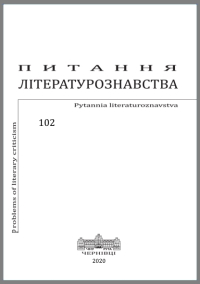Креатив індиферентності “перетягувача часів” Ґреґорa фон Реццорі
The Creative Indifference of a “Shifter of Registers” (Epochenverschleppe) – Gregor Von Rezzori
Author(s): Tetiana BasniakSubject(s): Studies of Literature, German Literature
Published by: Чернівецький національний університет імені Юрія Федьковича
Keywords: the creative indifference; postmodernism; irony; category of time; intertextuality; “Oedipus at Stalingrad”; “On My Own Traces”;Gregor von Rezzori;
Summary/Abstract: The body of the article goes on to highlight the problem of Gregor von Rezzori’s extravagant, lavish and idiosyncratic style entwined with his innate exquisite irony and scepticism, sometimes sarcasm, which can be inferred from his stance of indifference to social norms and trends.In the given context, the most expressive and illustrious are Rezzori’s novels “Oedipus Prevails at Stalingrad” (1954) and “On My Own Traces” (1997), which reflect the author’s ambitious venture into his autobiographical mythologizing from a perspective of the category of time and shed the light on how the artist’s negative experience can be turned into creative indifference. Of particular value, for our research, is the convergence of timeless themes and the ideological intertextuality created in two different surroundings, and provoked by fateful historical events. Rezzori’s irony of his own search for self-identity, a distinguishing feature for postmodern poetics, is one of the most critical topics to perceive the author’s personal experience. Transforming his childhood memories of his lost homeland into the imaginative artistic style, the author succeeded in creating a mythical topos, derived from the personal author’s mythologies (his autobiographical fiction “An Ermine in Czernopol” serves as an excellent example). It should be articulated, that pervasive irony and self-irony are key features of the author’s style. With his novel “Oedipus at Stalingrad”, Rezzori prior to postmodernism in art, foreshadowed his conceptual principles, philosophical fundamentals and worldview. In time, his fiction “On My Own Traces” picked up the threads of the ideas of “Oedipus” quintessence. To conclude, Rezzori’s mystical experiences of his childhood are preserved in his fiction like the most precious treasures that reveal the childish fragile soul seeking for its recognition. To grasp Rezzori’s philosophy, we should realize the author’s key concept – the category of time, which enables him to recognize himself as “Epochenverschlepper”: in his fiction, time lines are blurred, to some extent they become meaningless and functionally typify human history continuity. Consequently, in periods when everything seems rickety and unsettled: the past, the present, and the unpredictable future, the author dares to delve into in-depth psychology of human feelings and knowing thy-self.
Journal: Питання літературознавства
- Issue Year: 2020
- Issue No: 102
- Page Range: 74-87
- Page Count: 14
- Language: Ukrainian

